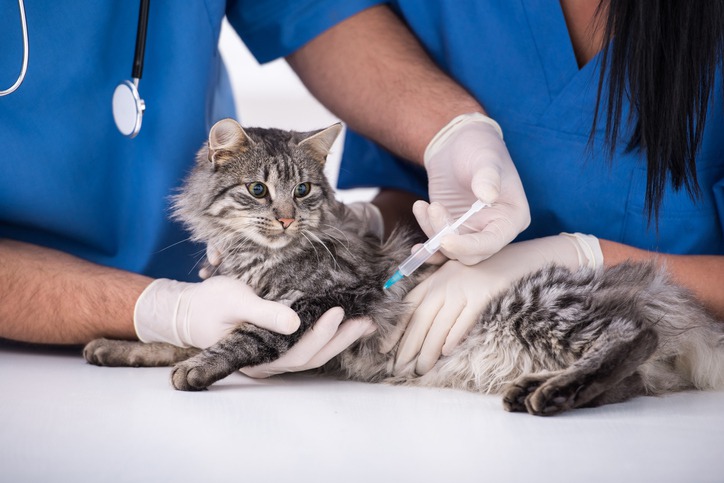As a cat owner, one of your many responsibilities includes keeping up with your furry friend’s health care needs, which entails vaccinations. These preventive measures are vital for warding off various diseases and keeping your pet healthy. Let’s dive into how often your cat should get vaccinated, discuss different types of vaccines, and understand the schedule that keeps your feline friend in tip-top shape.
What Are Vaccines and Why Are They Important?
Vaccines contain antigens that mildly stimulate the immune system without infecting the pet. This preparation allows the cat’s immune system to identify and fight off the real disease should it ever be encountered. For cats, vaccines are a shield against a range of infections, some of which can be fatal or severely debilitating.
The Core Vaccines Every Cat Needs
Core vaccines are considered essential for cats regardless of their lifestyle. These protect against feline panleukopenia (distemper), feline herpesvirus, feline calicivirus, and rabies.
Kitten shots begin when your little one is around six to eight weeks old, with boosters every three to four weeks until they are about 16 weeks old. This series is essential to protect them from common infections, especially since their immune systems are still developing.
Non-Core Vaccines and Lifestyle Considerations
Beyond core vaccines, the non-core vaccines are given based on your cat’s lifestyle and risk of exposure to specific diseases. These can include vaccines for feline leukemia virus (FeLV), feline immunodeficiency virus (FIV), and others that might be recommended depending on your area and your cat’s activities.
Adult Cat Vaccination Frequency
After receiving the initial kitten vaccinations, adult cats typically require booster shots every one to three years. The specific timing for booster vaccinations can vary based on several factors, including the type of vaccine, your cat’s overall health, their age, and their exposure risk to certain diseases.
Type of Vaccine
Different vaccines protect against specific diseases, and each may have its own recommended booster schedule. Your veterinarian will tailor the vaccination plan based on your cat’s individual needs and the prevalence of certain diseases in your region.
Cat’s Health
The health status of your cat plays a role in determining the vaccination frequency. Cats with certain health conditions may require more frequent vaccinations or, in some cases, may need to follow a modified vaccination schedule.
Cat’s Age
Age can impact the vaccination schedule. Adult cats may not need vaccinations as frequently as kittens, but your veterinarian will determine the specific timing based on your cat’s age and health history.
Exposure Risk
Cats with a higher risk of exposure to certain diseases, such as those that spend time outdoors or come into contact with other cats, may need more frequent vaccinations. Your veterinarian will consider your cat’s lifestyle when recommending the appropriate vaccination schedule.
List of Vaccines and Their Typical Schedule
In creating a tailored vaccination schedule for your cat, it helps to have an understanding of the typical timeframe for each vaccine:
-
Rabies: The initial vaccine is given around 12 weeks of age, with a booster after one year, then every one to three years, depending on the vaccine.
-
Feline Distemper (Panleukopenia): After the initial series as a kitten, adult cats get a booster one year later, then every three years.
-
Feline Herpesvirus and Calicivirus: The schedule is the same as for Feline Distemper.
-
Feline Leukemia (FeLV): Administered to kittens and high-risk cats, with a booster one year after the initial dose and then based on the vet’s recommendation.
Does My Indoor Cat Need Vaccinations As Often?
Even indoor cats need protection. They may still be exposed to diseases through humans, other pets, or if they accidentally escape outdoors. Discuss the right vaccination plan for your indoor cat with your vet—it might have slight adjustments but should not be neglected.
Your Cat’s Health Record and Reminders
Keep a health record for your cat detailing all vaccinations received, along with the dates and any reactions noted. This will be important for future vet visits or if you ever need to board your cat. It’s also helpful to set up reminders for upcoming shots to ensure your cat stays on schedule.
What If My Cat Misses a Vaccination?
Life gets busy, and sometimes, vaccination appointments may be missed. If this happens, make a new appointment as soon as possible. Your cat may require additional booster shots to build up immunity again, depending on how much time has passed.
Vaccinations and Veterinary Surgery
It’s important to ensure that a cat’s vaccinations are up to date before any vet surgical procedures to reduce the risk of postoperative infections. This attention to preventative care can aid a swift recovery and lessen potential complications. Know more about your chosen vet and their vet surgical procedures by checking on their website.
Veterinary Dentistry and Your Cat’s Health
While ensuring your cat’s vaccination is crucial, don’t overlook other aspects of their health, like dental care. A veterinary dentist in Pennsylvania, PA, can provide professional dental cleaning and care that can prevent oral diseases that, if left untreated, can affect your cat’s overall health.
Wrapping Up
Staying up to date with your cat’s vaccinations is a critical part of pet ownership that safeguards their health and well-being. By working closely with your vet, you can establish a vaccination routine that corresponds to your cat’s unique needs, keeping them protected throughout their lives. Remember, a healthy cat is a happy cat, and vaccinations are one of the best ways to ensure that happiness.

